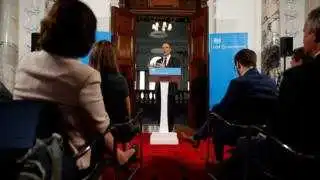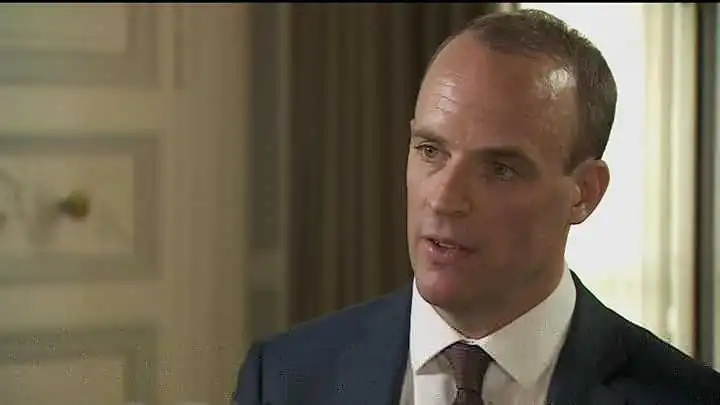 Image copyright Reuters
Image copyright Reuters
Brexit Secretary Dominic Raab said he hoped the no-deal preparations would be "rendered redundant" by an agreement with the EU
Brexit Secretary Dominic Raab has set out what he called "practical and proportionate" advice in case the UK leaves the EU with no deal.
The government has published 148 pages of guidance for people and businesses.
It includes instructions for businesses who could face extra paperwork at borders and contingency plans to avoid medicine shortages.
Ministers say reaching a deal is their top priority but that "short term disruption" is possible without one.
Among the issues raised in the 25 documents is a likely increase in the cost of card payments between the UK and the EU, a plan for the UK to recognise medical devices approved for the EU market to maintain a smooth supply, and the end of free circulation of goods between UK and EU.
Mr Raab said reaching a deal with the EU was the "overriding priority" and "by far the most likely outcome" but that "we must be ready to consider the alternative".
He also dismissed "wilder claims" about the impact of not reaching a deal, including the claim that the Army would be deployed to maintain food supplies.
BBC political correspondent Chris Mason described the publication as a "vast swirling porridge of detailmuch of it at a technical level, advising individual industries about the manner in which they are regulated in the event of a no-deal Brexit".
The EU has already produced 68 notices on "Brexit preparedness".
Labour said a no-deal outcome would be "catastrophic" and a "complete failure by the government to negotiate for Britain".
The UK is due to leave the EU on 29 March 2019, but the future relationship between the two sides has yet to be agreed.
In recent weeks there have been more warnings about what might happen if the UK and the EU have not reached a deal by Brexit day.
These have ranged from health bodies' concerns about medical supplies crossing borders to the impact of trade barriers on UK farmers.
What's happening today?
The government is publishing 25 "technical notices" setting out what it is doing to prepare for no-deal, an outcome it insists it is confident of avoiding.
About 80 notices are expected to be released in the coming weeks. This first batch covers areas including medical supplies, financial services, nuclear safeguards, farming and organic food production.
Brexit Secretary Dominic Raab said longstanding arrangements were in place to cope with border disruption.
On the NHS, he said six weeks' worth of medical supplies would have to be stockpiled, that the UK already had three months of "buffer stock" in more than 200 medicines, and that it was was largely self-sufficient in terms of blood supplies.
On financial services, he said banks could set up subsidiaries to avoid losing their passporting rights.
"There are risks here but let's not have the risks blown out of proportion," he also said.
In a speech, he said a good deal was in sight but "we have a duty, as a responsible government, to plan for every eventuality".
Warnings about no deal
Niall Dickson, of the Brexit Health Alliance, told BBC Radio 4's Today programme: "If we do not get the planning right, in our view patients' lives could be at risk."
His message to ministers was "we need to categorically ensure that patients are going to be protected".
Other recent warnings about leaving without a deal have included:
- the group representing hospitals and ambulance services in England warning of possible "stockpiles and shortages of medicines and medical devices"
- police chiefs warning of a risk to the public if the UK loses access to EU-wide crime databases
- the farmers' union saying some farms could be "on the brink of collapse" without frictionless trade after Brexit
- Bank of England governor Mark Carney describing a no-deal outcome as "highly undesirable"
- Foreign Secretary Jeremy Hunt saying a "messy divorce" would lead to a "fissure in relations between European allies that would take a generation to heal"
Pro-Brexit campaigners have described the warnings as "Project Fear"saying the UK has nothing to fear from leaving without a trade deal and falling back on World Trade Organization rules.
Conservative MP Jacob Rees-Mogg told Today such an arrangement "would suffice" and said the risks had been "absurdly overstated".
On Tuesday Mr Raab said: "As you will see when we set out our plans, some of these hair-raising scare stories are very far from the truth and I look forward to explaining the context on Thursday."
He also said EU nationals living in the UK would be entitled to stay, even without a deal in place.

Dominic Raab is asked about what no Brexit deal would mean for EU nationals living in the UK
In some cases the UK will take "unilateral action" to maintain continuity in whatever the EU does, he said. This could include deciding to follow the EU's medical regulatory framework to ensure a smooth supply.
Many of the "challenges" presented by a no deal would also affect the EU, Mr Raab said, adding: "For our part, if the negotiations fail, we will not stop to behave as responsible European neighbours, partners and allies."
The view from the EU
Last month, the European Commission said the UK leaving without a deal in place would mean there would be "no specific arrangement" for EU citizens living in the UK or for UK citizens in the EU.
It also warned that increased border controls would mean transport between the UK and EU was "severely impacted", with the possibility of "significant delays".
International Trade Secretary Liam Fox recently said the likelihood of failing to reach a deal was "60-40".
And Foreign Secretary Jeremy Hunt has warned that without a change of approach there is a "very real risk of a Brexit no deal by accident".
Labour's Brexit spokesman Sir Keir Starmer told Radio 4's Today programme the government was "now moving into panic mode" and this latest advice would not reassure anyone.
"If the publication of these documents is just a crude attempt by ministers to dress up the severe consequences of a no-deal Brexit as somehow acceptable, the whole exercise will be pointless," he said.
The Liberal Democrats said publishing the documents was a "vain and desperate attempt" to make the government's Brexit plan look good.
The British Chambers of Commerce said businesses had "waited too long for answers to some basic questions around Brexit" and had been "particularly frustrated by the lack of clear guidance".
Director general Adam Marshall said: "Our test for the government's 'no-deal' notices is straightforward. Do firms now have the clarity they need so that they can continue to conduct business both here at home and across borders on 30 March 2019?"
Do you have any questions about what would happen in the event of a no-deal Brexit?
Use this form to ask your question:
If you are reading this page on the BBC News app, you will need to visit the mobile version of the BBC website to submit your question on this topic.